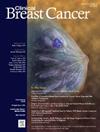A Phase I Trial of Alpelisib Combined With Capecitabine in Patients With HER2-Negative Metastatic Breast Cancer
IF 2.9
3区 医学
Q2 ONCOLOGY
引用次数: 0
Abstract
Background
Alpelisib is an oral α-specific class I PI3K inhibitor approved in combination with fulvestrant for the treatment of PIK3CA-mutated hormone receptor-positive (HR+), human epidermal growth factor receptor 2 negative (HER2-) metastatic breast cancer. The tolerability of this drug with the oral chemotherapy capecitabine is unknown.
Patients and Methods
This phase I trial evaluated the dose-limiting toxicities (DLTs) and maximum tolerated dose (MTD) of alpelisib (250 mg or 300 mg daily for 3-weeks) with capecitabine (1000 mg/m2 twice daily for 2-weeks followed by a 1-week rest period) in patients with metastatic HER2-negative breast cancer, regardless of PIK3CA mutation status.
Results
Eighteen patients were treated with alpelisib-capecitabine. Half of the patients had HR+ breast cancer, and 16 had prior systemic therapy for metastatic disease. The MTD of alpelisib was 250 mg daily in combination with capecitabine 1000 mg/m2 twice daily. DLTs included hyperglycemia, QTc prolongation, fatigue, and chest pain. The most common grade 3 adverse event (AE) was hyperglycemia (28%). No grade 4 AEs were observed. Three patients discontinued therapy due to an AE. One-third of patients required dose reduction of both alpelisib and capecitabine. Four patients experienced a partial response and 8 patients experienced stable disease. The median progression-free survival was 9.7 months (95% CI 2.8-13.5 months) and median overall survival was 18.2 months (95% CI 7.2-35.2 months). Twelve patients had PIK3CA mutation testing completed, of these 2 had known or likely deleterious PIK3CA mutation.
Conclusion
This study provides safety data for an oral combination therapy of alpelisib-capecitabine and defines tolerable doses for further study.
HER2阴性转移性乳腺癌患者阿柏西尼联合卡培他滨的I期试验
研究背景阿哌替尼是一种口服α特异性I类PI3K抑制剂,已被批准与氟维司群联合用于治疗PIK3CA突变的激素受体阳性(HR+)、人表皮生长因子受体2阴性(HER2-)的转移性乳腺癌。该药物与口服化疗卡培他滨的耐受性尚不清楚:这项I期试验评估了转移性HER2阴性乳腺癌患者的剂量限制性毒性(DLTs)和阿培利西(每天250毫克或300毫克,连续3周)与卡培他滨(1000毫克/平方米,每天两次,连续2周,然后休息1周)的最大耐受剂量(MTD),无论患者的PIK3CA突变状态如何:18名患者接受了阿柏西尼-卡培他滨治疗。半数患者患有HR+乳腺癌,16名患者曾因转移性疾病接受过全身治疗。阿来替尼的MTD为每天250毫克,联合卡培他滨每天两次,每次1000毫克/平方米。DLT包括高血糖、QTc延长、疲劳和胸痛。最常见的3级不良事件(AE)是高血糖(28%)。未观察到 4 级不良反应。有 3 名患者因 AE 而中断治疗。三分之一的患者需要减少阿来替尼和卡培他滨的剂量。4名患者出现部分应答,8名患者病情稳定。中位无进展生存期为9.7个月(95% CI为2.8-13.5个月),中位总生存期为18.2个月(95% CI为7.2-35.2个月)。12名患者完成了PIK3CA突变检测,其中2名患者存在已知或可能的有害PIK3CA突变:本研究为阿柏西尼-卡培他滨口服联合疗法提供了安全性数据,并为进一步研究确定了可耐受的剂量。
本文章由计算机程序翻译,如有差异,请以英文原文为准。
求助全文
约1分钟内获得全文
求助全文
来源期刊

Clinical breast cancer
医学-肿瘤学
CiteScore
5.40
自引率
3.20%
发文量
174
审稿时长
48 days
期刊介绍:
Clinical Breast Cancer is a peer-reviewed bimonthly journal that publishes original articles describing various aspects of clinical and translational research of breast cancer. Clinical Breast Cancer is devoted to articles on detection, diagnosis, prevention, and treatment of breast cancer. The main emphasis is on recent scientific developments in all areas related to breast cancer. Specific areas of interest include clinical research reports from various therapeutic modalities, cancer genetics, drug sensitivity and resistance, novel imaging, tumor genomics, biomarkers, and chemoprevention strategies.
 求助内容:
求助内容: 应助结果提醒方式:
应助结果提醒方式:


